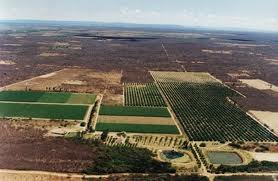ITR (Rural Real Estate Tax; Imposto territorial rural)
Currently, the rural real estate property tax (ITR) is charged by the Federal Government. The rate used varies with the area of the property and its level of use. The calculation basis is the value of land without any kind of improvement or improvement (including plantations): that is, the value of bare land. The function of the ITR is extrafiscal. It functions as an auxiliary instrument for regulating the government on the farms. Part of the revenue goes to the city and state tax collector, in variable proportions, as the oversight entity acting is more expressive, or whoever oversees takes the biggest chunk of the tax.
The tax rates of this tax are established in a manner to discourage the maintaining of unproductive properties and it is not levied on small rural properties provided that the owner exploits it with his family and the owner does not own other real estate property. The ITR has become much higher for non-productive properties. This measure helped end the ” unproductive large properties” (large land ownership that produce nothing, and served as a financial reserve or speculation). The unproductive farmlands were a secular reality in Brazil, flag of political struggle and militancy. The highest ITR made the unproductive large farmlands ceased to be economically interesting. This was one of the reasons for the recent “boom” of agribusiness in Brazil from the 1990s . The tax on rural property is paid by every taxpayer, person or entity that has a rural property. The taxpayer’s tax domicile is the location of the municipality of rural property.


